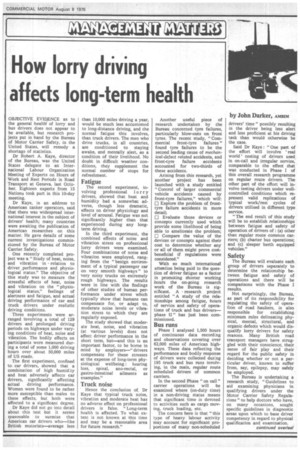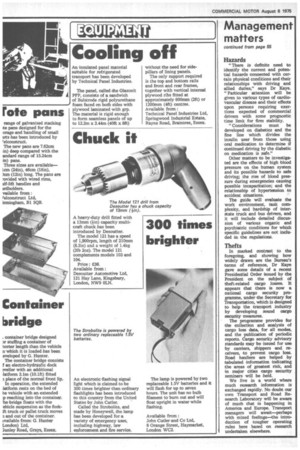How lorry driving affects long-term health
Page 57

Page 58

If you've noticed an error in this article please click here to report it so we can fix it.
by John Darker, .AIVIBINI
OBJECTIVE EVIEIENCE as to the general health of lorry and bus drivers does not appear to be available, but research projects put in hand by the Bureau of Motor Carrier Safety, in the United States, will remedy a shortage of statistics.
Dr Robert A, Kaye, director of the Bureau, was the United States delegate to an Inter national Labour Organisation Meeting of Experts on Hours of Work and Rest Periods in Road Transport at Geneva, last October. Eighteen experts from 15 Nations took part in this 10-day meeting.
Dr Kaye, in an address to American tanker operators, said that there was widespread inter national interest in the subject of drivers' health; many countries were awaiting the publication of American researches on this matter. He gave details of some current investigations commissioned by the Bureau of Motor Carrier Safety.
One recently completed project was a." Study of heat, noise, and vibration in • relation to driver .performance and physiological status." The objective of this study was to measure the stressful effects of heat, noise and vibration on the "physio logical status," feelings of alertness and fatigue, and actual driving performance of car and truck drivers under realistic driving conditions.
Three experiments were arranged involving a total of 129 drivers and prolonged driving periods on highways under varying conditions of heat, noise and vibration. The bodily effects on participants were measured during a total of some 1,000 driving hours over about 50,000 miles of US roads.
The first experiment, confined to tar drivers, showed that a combination of high humid:ty and 'heat adversely affects car drivers, significantly affecting actual driving performance. Women were found to be rather more susceptible than males to these effects, but both were affected to a significant degree.
Dr Kaye did not go into detail about this test but it seems reasonable to 'surmise that American car drivers who—like British motorists—average less than 10,000 miles driving a year, would be much less accustomed to long-distance driving, and the normal fatigue this involves, than truck drivers. The men who drive trucks, in all countries, are conditioned to staying awake, .and mentally alert, as a condition of their livelihood. No doubt in difficult weather conditions, they supplement the normal number of stops for refreshment.
Fatigue
The second experiment, involving professional lorry drivers, showed that heat and humidity had a somewhat adverse, though less dramatic, effects on driver physiology and level of arousal. Fatigue was not significantly higher than that experienced during any longterm driving.
In the third experiment, The combined effects of noise and vibration stress on professional lorry drivers were examined. Four combinations of noise and vibration were employed, ranging from the "benign environment of a typical passenger car on very smooth 'highways" to very noisy trucks on extremely rough highways. The results were in line with the findings of other studies of human performance under stress which typically show that humans can compensate for, or adapt to, moderate noise levels or vibration stress to which they are regularly exposed.
The study showed that moderate heat, noise, and vibration (at various levels) does not affect driver performance in the short term, but—and this is an important factor, to be borne in mind by employers—" drivers compensate for these stresses at the expense of long-term physiological wellbeing : hearing loss, spinal, ano-rectal, or gastro-intestinal ailments as examples."
Truck noise
• Hence the conclusion of. Dr Kaye that typical truck noise, vibration and moderate heat has no adverse effect on professional drivers is false. "Long-term health is affected. To what extent is not known at this time and may be a reasonable area for future research." Another useful piece of research undertaken by the Bureau concerned tyre failures, particularly blow-outs on front tyres. The recent study, "Commercial front-tyre failures" found tyre failures to be the second leading cause of mechanical-defect related accidents, and front-tyre failure accidents accounted for two-thirds of these accidents.
Arising from this research, yet another project has been launched with a study entitled "Control of larger commercial vehicle accidents caused by front-tyre failures," which will: o Explore the problem of fronttyre failure accidents in more detail; I=1 Evaluate those devices or concepts currently used which provide some likelihood of being able to ameliorate the problem; DI Compare the value of the devices or concepts against their cost to determine whether any or all of them might prove costbeneficial if regulations were considered."
With so much international attention being paid to the question of driver fatigue as a factor in promoting shorter working homes the on-going research work of the Bureau is significant. A • research project entitled "A study of the relationships among fatigue, hours of service and safety of operations of truck and bus drivers— phase II" has just been commissioned.
Bus runs
Phase I analysed 1,500 hours of continuous data recard:ng and observations covering over 62,000 miles of American highways. These data reflecting the performance and bodily response of drivers were collected dunng 195 itruck and bus runs involving, in the main, regular route scheduled drivers of common carriers.
In the second Phase "on call" carrier operations will he examined where (on-duty. time) in a non-driving status means that significant time is devoted to activities such as cargo moving, truck loading, etc.
The concern here is that "this type of 'heavy labour activity may account for significant proportions of many non-scheduled drivers' time" possibly resulting in the driver being less alert and less proficient at his driving task than would otherwise be the case.
Said Dr Kaye : "One part of the effort will involve 'real world' testing of drivers used in on-call and irregular service,' comparable to the effect that was conducted in Phase I of this overall research programme on regular route drivers. The other part of the effort will involve testing drivers under wellcontrolled conditions which represent valid replications of typical work/rest cycles of drivers utilised in different type service.
"The end result of this study will .be to establish relationShips between fatigue and safety of operation of drivers of : (a) other than regular route common carriers; (b) charter bus operations; and (c) sleeper berth equipped' vehicles."
Safety
The Bureau will evaluate each group of drivers separately to determine the relationship between fatigue and safety of operations and there will be comparisons with the Phase I results.
Not surprisingly, the Bureau, as part of its responsibility for regulating the safety of operation of road hauliers, is also responsible for establiShing. minimum rules delineating physical, mental, atrudtural, and organic defects which would disqualify lorry drivers for safety reasons. Many British road transport managers have struggled with their conscience; their sense of fair play and theist' :regard for the public safety in deciding whether or not a particular driver, known to suffer from, say, epilepsy, may safely be employed.
The Bureau is undertaking a research study, "Guidelines to aid examining physicians in qualifying drivers under the Motor Carrier Safety Regulations" to help doctors who have, on many occasions, sought specific guidelines in diagnostic areas upon which to base driver competency in regard to physical qualification and examination.
Hazards
"There is definite need to identify the current and potential hazards connected with certain physical conditions and their relationships with driving and allied duties," says Dr Kaye. "Particular attention will be given to various types of cardiovascular disease and their effects upon persons requiring exertions expected of commercial drivers with some prognostic time limit for firm stability.
"Considerations must be developed on diabetics and the fine line which divides the insulin user from those using oral medication to determine if continued driving by the diabetic on medication is safe."
Other matters to be investigated are the effects of high blood pressure on the human system and 'its possible hazards to safe driving; the rise of blood pressure during emergencies causing possible incapacitation; and the relationship of hypertension to accident situations.
The guide will evaluate the work environment, task complexity, and hardship of interstate truck and bus drivers, and it will include detailed discussion of various organic and psychiatric conditions for which specific guidelines are not included in the regulations.
Thefts
In marked contrast to the foregoing, and showing how widely drawn are the Bureau's terms of reference, Dr Kaye gave some details of a recent Presidential Order issued by the President on the subject of theft-related cargo losses. It appears that there is now a national cargo security programme, under the Secretary for Transportation, which is designed to help the transport industry by developing sound cargo security measures.
The programme provides for the collection and analysis of cargo loss data, for all modes, and the publication of periodic reports. Cargo security advisory standards may be issued for use by carriers, shippers and receivers, to prevent cargo loss. Road hauliers are helped by tabulated information indicating the areas of greatest risk, and in major cities cargo security seminars will be held.
We live in a world Where much research information is exchanged rapidly. No doubt out own Transport and Road Research Laboratory will be aware of much that is happening in America and Europe. Transport managers will await—perhaps with mixed feelings—the introduction of tougher operating rules here based on research undertaken elsewhere.




































































































